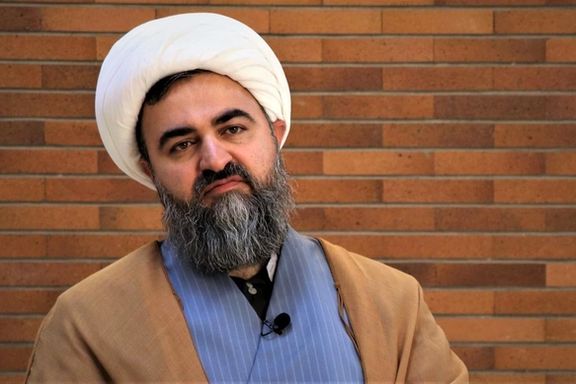Cleric Says Low Turnout Boosted Morale Among Iran Dissidents

A Shia cleric critical of Iran’s Supreme Leader says a wave of confidence has swept through dissidents after 60% of voters refused to participate in the June 28 presidential election.

A Shia cleric critical of Iran’s Supreme Leader says a wave of confidence has swept through dissidents after 60% of voters refused to participate in the June 28 presidential election.
Mohammad Taghi Akbarnejad, a conservative cleric teaching at the Qom seminary, made the comment Sunday during a YouTube debate on “Boycotting or Participating in Elections.”
Highlighting the newfound confidence among the dissidents, he said the election result represented a shift in public opinion. He labeled it a “new national identity” and called on the authorities to accept it.
At least 60 percent of the 61.5 million eligible voters abstained from voting on June 28, according to official figures. However, many believe the turnout was even lower than officially reported, possibly as low as 20 percent, suggesting that over 80 percent of voters might have boycotted the election.
"See the confidence that has been instilled among the dissidents. Before the election, we hadn't anticipated that 60% of the people would abstain. The nation has suddenly come forward and declared, 'We are here, and we understand.' The next step is to embrace the nation's new identity."
Describing it as an “asset," he added that the low voter turnout can be used for change if leaders can channel the underlying public dissatisfaction into a focused movement. He said that expressing dissent, even through non-participation, can be a powerful force for change, as shown by Rouhollah Khomeini's successful mobilization during the Islamic Revolution in 1979.
"If the elites can turn this into a movement and identify the demands of this 60% and become their voice, they can use it for future steps. That’s the role of a politician. It’s a significant asset declaring opposition. What did Ayatollah Khomeini do? He turned this dissent into 'Death to the Shah slogans.'"
Throughout the program, Akbarnejad insisted that he does not promote regime change in Iran. He was arrested and transferred to an undisclosed location in February for his critical comments about parliamentary elections that took place on March 1, "insulting" Supreme Leader Ali Khamenei and criticizing the Islamic Republic’s track record during the past 45 years." He later announced in an audio file that he had been released on bail. Following his arrest, the number of his followers on Instagram rose from around 1,000 to over 93,000.
His arrest happened after a video of him went viral in which he said that "both voting and not voting in the elections carry a message to the government and reflect people's reaction to the officials' [objectionable] performance." He also directly challenged the leaders of the Islamic Republic by questioning the practical benefits of religion for the people. "I do not believe in a religion that does not serve the nation's interests," he boldly declared.
Elsewhere during the Sunday debate, he asserted that public trust in the government has eroded to an unprecedented extent, marking a stark contrast to the era when reformists held sway. "The public is no longer easily duped; they are prepared to pay the price."
He implored the government to uphold Article 27 of the Constitution and acknowledge the people's right to protest, cautioning the Islamic Republic: "Even in your own self-interest, if you want to remain in power, you must yield to the people's will."
According to Article 27 of the Constitution, "Gatherings and demonstrations without arms, provided that they do not contravene the foundations of Islam, shall be free."
With pro-reform Masoud Pezeshkian and ultra-hardliner Saeed Jalili in Iran's July 5 runoff, debates among Iranians over participation are heating up. Some advocate voting for Pezeshkian to prevent Jalili's win, while others consider boycotting the vote once again.